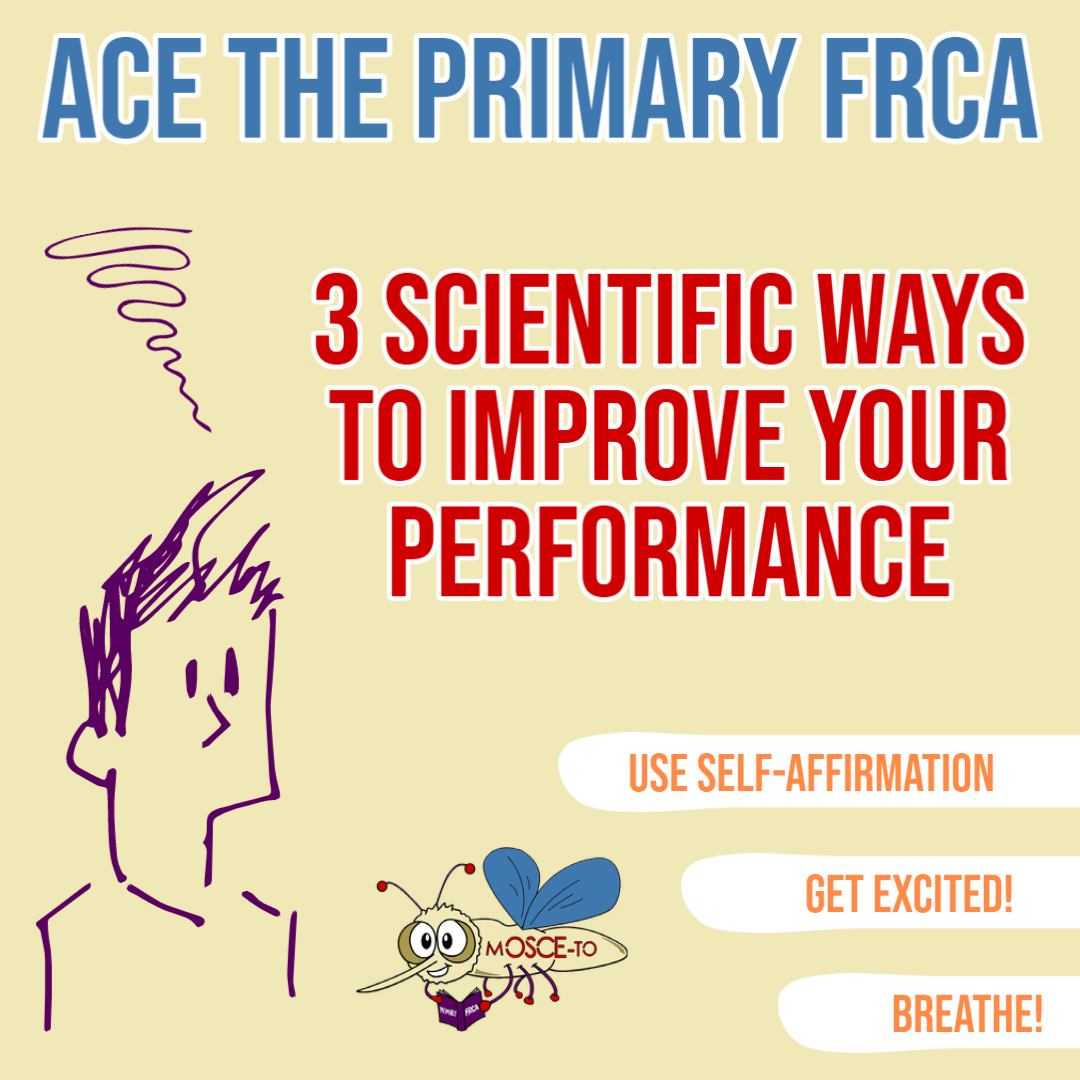Ace your Primary FRCA using Science (2 min read)
As exam week is underway, I thought it would be useful to provide you with some of the tips we give to course attendees to help them maximise their marks.
These tips have been chosen specifically to optimise your performance so that you can show the examiners all the knowledge that you have learnt! (plus, crucially they are all backed by science!)
Get Excited!
You know that phrase – “keep calm and carry on”.
What if keeping calm was the opposite of what you needed when it comes to managing your anxiety before an exam? Could it be that you need to get excited to perform at your best?
Alison Wood Brooks, a professor at Harvard Business School, conducted a number of studies looking at the effect of reframing anxiety as excitement. She tested her hypothesis against a number of “anxiety inducing” scenarios such as karaoke singing, public speaking and the most dreaded, maths tests.
What she found was that those with neutral or “keep calm” messages ended up with similar performances, whilst it was the “get excited” group that far outperformed their peers.
Astounding right?
The use of simple strategies such as self-talk (e.g., saying “I am excited” out loud) or simple messages (e.g., “get excited”) had the effect of not only getting test subjects excited, but changed their mindset from “threat-based” to “opportunity based” and therefore overall improved their subsequent performance.
Use it to your advantage – Get excited, say “I am excited” and remember, it’s showtime :)!
2. Use self-affirmation to your advantage
The act of self-affirmation involves writing about your core personal values and beliefs, and repeating them at regular intervals. The aim of this is to ensure that one’s basic need, a sense of self, can be maintained in spite of external events, therefore ensuring optimal performance and growth.
This is a heavily studied field of psychology, with self-affirmation shown to significantly reduce neurobiological and behavioural responses to stress, therefore buffering stress and aiding problem solving and creativity. There are countless studies which prove that self-affirmation not only improves education, health and relationship outcomes, but can also have the potential to persist for years.
How can you make affirmations work for you? Firstly, affirmations target specific ideas that you struggle with. They are especially useful if you want to target a weakness.
· Target a specific area of your life you wish you change
· Make your affirmation realistic and achievable
· Reword your negatives into positives
· Write it in the present tense
· Say it with feeling
Use the examples below in between OSCE stations or VIVA sessions to reach your optimal performance.
I am an excellent anaesthetist
I am knowledgeable and proud of myself
I am passing the Primary FRCA
3. Breathe (through the nose)
This is my favourite technique of all. Why?
Because we all do it at least 17 280 times in 24 hours!
A ground breaking study published in the Journal of Neuroscience looked at the importance of nasal breathing vs mouth breathing, and cognitive function. What they found was that the act of breathing through the nose influenced behaviour in the amygdala and hippocampus, an effect that was diminished when breathing through the mouth.
Another important study looked at the effect of breathing modulation on the ability to perform cognitive tasks in a time controlled setting. They found that those who controlled their breathing were able to perform the required task quicker (!)
Breathing can modulate cognitive function, and therefore help you reach your peak performance!
My favourite way to put this into practice – Box breathing.
Breathe in for 4 seconds
Hold for 4 seconds
Breathe out for 4 seconds
Hold for 4 seconds
Repeat!
(remember to breathe in through the nose and out through the mouth!)
Conclusion
The above techniques will help you to manage your stress and anxiety, and reach your peak performance. You have put in all the hard work - now it’s time to show it off!
A parting line to you all:
Take a deep (nasal) breath in.
You are passing the Primary FRCA.
Get excited!
Good luck :)
References and further reading
Get Excited
Get excited: reappraising pre-performance anxiety as excitement.Brooks AW. J Exp Psychol Gen. 2014 Jun;143(3):1144-58. doi: 10.1037/a0035325. Epub 2013 Dec 23. PMID: 24364682.
Self Affirmations
Neural mechanisms of self-affirmation's stress buffering effects. Social cognitive and affective neuroscience, Dutcher, J. M., Eisenberger, N. I., Woo, H., Klein, W., Harris, P. R., Levine, J. M., & Creswell, J. D. (2020). 15(10), 1086–1096. https://doi.org/10.1093/scan/nsaa042
Self-affirmation improves problem-solving under stress. Creswell, J. D., Dutcher, J. M., Klein, W. M., Harris, P. R., & Levine, J. M. (2013). PloS one, 8(5), e62593. https://doi.org/10.1371/journal.pone.0062593
The Psychology of Change: Self-Affirmation and Social Psychological Intervention, Geoffrey L. Cohen and David K. Sherman, Annual Review of Psychology201465:1,333-371
https://www.mindtools.com/pages/article/affirmations.htm
Breathing techniques
Nasal Respiration Entrains Human Limbic Oscillations and Modulates Cognitive Function
Christina Zelano, Heidi Jiang, Guangyu Zhou, Nikita Arora, Stephan Schuele, Joshua Rosenow, Jay A. Gottfried, Journal of Neuroscience 7 December 2016, 36 (49) 12448-12467; DOI: 10.1523/JNEUROSCI.2586-16.2016
Respiratory modulation of cognitive performance during the retrieval process
Nakamura NH, Fukunaga M, Oku Y (2018) Respiratory modulation of cognitive performance during the retrieval process. PLOS ONE 13(9): e0204021. https://doi.org/10.1371/journal.pone.0204021


